
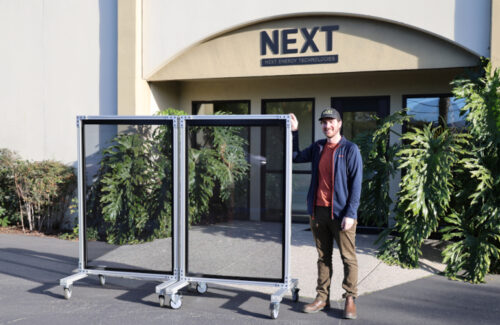
NEXT Energy Technologies, a pioneer in organic photovoltaic (OPV) technology, has upgraded its trial production line in California to produce 40 x 60 inch laminated transparent power windows using its unique NEXT OPV coating and manufacturing process. The company stated that these 40 x 60 inch units are the world's largest transparent OPV windows. This trial production marks an important step for the glass industry towards producing full-size visual area glass for cleaning and solar powered exterior walls. NEXT OPV coating solves three major challenges in creating scalable solutions for the commercial glass industry: aesthetics, performance, and manufacturability. The neutral gray coating imitates the most commonly used color in North American commercial exterior walls, combined with power generation and online manufacturing, creating a valuable solution for the glass industry. The combination of the highest quality aesthetics, power generation, and integration with the glass supply chain is a key factor driving net zero building design, "said Andy Cohen, Co Chairman of Gensler, a construction group." Just last year, we showcased NEXT's 27 x 35 inch OPV windows in our Los Angeles office. With this larger window format, we can focus on sustainable building projects NEXT is preparing demonstration facilities with major partners in the United States and Europe, while focusing on transitioning from pilot to production scale and obtaining UL safety and performance certifications for grid connected projects. Daniel Emmett, co-founder, executive chairman, and CEO of NEXT, said, "This milestone further demonstrates the industry's thirst for solutions, where our OPV coating combined with advanced manufacturing processes is effective, scalable, and can be quickly deployed. This is evidence that gives us confidence in achieving commercial production of 60 x 120 inches NEXT's proprietary transparent OPV coating can transform commercial windows into clean energy generating exterior walls, making buildings more sustainable and resilient, and reducing power grid pressure. These windows not only generate on-site electricity, but also absorb and convert infrared light, thereby reducing the building's HVAC requirements.
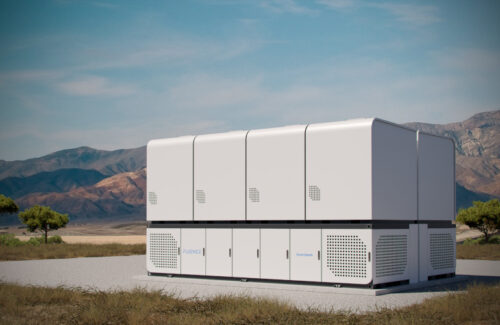
Fluence Energy's Smartstack energy storage platform is now commercially available for grid scale applications. The AC power system is expected to start delivery in the fourth quarter of 2025. Smartstack's patent pending design strategically breaks down battery storage systems into units that are easy to transport in terms of weight and size, thereby reducing transportation restrictions and installation complexity. On site, the system can maximize the density of the project site, providing up to 7.5 MWh of energy density when integrated with a 300 Ah power generation battery. This density is about 30% higher than the currently available communication systems. This platform can generate more megawatt hours of electricity within the existing project footprint, thereby reducing costs and making previously limited sites available for developing storage projects. Smartstack has reimagined energy storage design through a flexible modular architecture that can be tailored to meet different market demands. Two hour and four hour energy storage times, as well as longer six hour and eight hour energy storage times, are now available for purchase. The proprietary appearance of this product includes two key components: Intelligent slide rail - the basic platform that accommodates the core of the Smartstack system. The intelligent slide rail integrates advanced cooling equipment, power control system hardware, all cables, and comprehensive monitoring functions, and has convenient maintenance access. Battery compartment - The Smartstack battery compartment is located at the top of the Smart Skid and contains the system's battery units. The battery compartment supports battery units from multiple suppliers, ensuring the most competitive prices and optimal performance. The battery compartment is also designed to be interchangeable with replacement units during maintenance or technical upgrades to maximize system availability. Fluence President and CEO Julian Nebredo said, "Fluence's innovative record and execution speed drive us to lead the energy storage industry forward. With our industry-leading expertise in developing and deploying innovative solutions globally, Smartstack has reimagined the way systems are designed, built, and maintained. By addressing key challenges such as supply chain transportation restrictions, product density, maintainability, and modularity, we provide a platform that is more scalable and easier to operate than competitive solutions. This means that our clients can achieve excellent project economic benefits Smartstack's innovative approach ensures up to 99% availability and leverages Fluence's long-term service agreement to maximize revenue. Its innovative approach places intelligence, not hardware, at the core of innovation. This platform enhances system intelligence through locally deployed AI, autonomously optimizes embedded control, and provides comprehensive visibility across storage combinations.
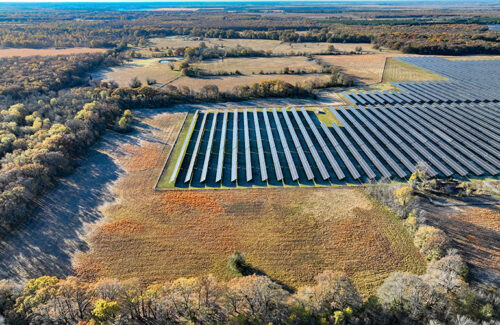
Invenergy announced that the 300 MW Delilah I solar center located in Lamar County and Red River County, Texas, has begun commercial operations. WEC Energy Group is the major shareholder of Delilah I. The energy generated by Delilah I Solar will be purchased by Honda Motor Company (200 MW) and Tesla (100 MW) through a Virtual Power Purchase Agreement (VPPA) and transmitted to the local power grid. Bristi Cure, senior vice president of renewable energy development of Invenergy, said: "Land owners and larger local communities have played an important role in Invenergy's realization of Delilah I commercial operation, creating good jobs for Texans, and cooperating with WEC, Honda, Tesla and other automobile giants to increase more American energy for the power grid." "With the growth of power demand, Invenergy attaches importance to every opportunity, supports customers' operation with affordable, reliable and clean energy solutions, and brings meaningful economic impact to Americans in our project community."
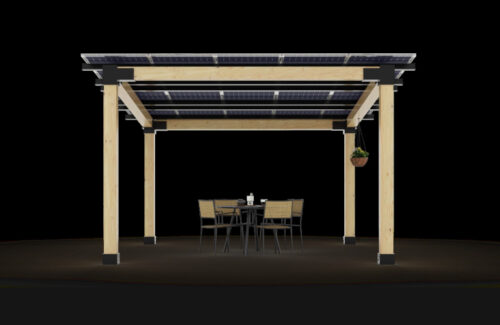
Brooklyn Solar Canopy is launching three new solar panel installation systems: Post Truss, Cantilever, and Wood Post. TR Ludwig, CEO of Brooklyn Solar Canopy and its sister company Brooklyn SolarWorks, said, "This expansion of our product line is a direct response to the constantly changing needs of our customers. By adding column trusses, cantilevers, and wooden column installation systems, we can now provide a complete solution for any project, from large-scale commercial installations to residential backyard installations. We are pleased to offer our customers more choices and help them achieve their solar energy goals, regardless of their unique requirements Rear truss The Post Truss system is highly suitable for residential and small commercial environments. It has a small foundation, unsupported span, and can withstand high wind and snow loads. It can be used to create solar carports or customer parking sheds, and can also customize integrated electric vehicle charging stations and other functions to maximize investment returns and provide multiple benefits. cantilever The cantilever installation system only provides support at one end, making it ideal for small and large commercial parking lots and sidewalks that require open pedestrian or driving areas. Compared to a full canopy, its design minimizes the structural footprint to the greatest extent possible. Wooden pillar The wooden pillar scheme provides a natural and aesthetically pleasing solution, making it ideal for residential and small commercial spaces that prioritize aesthetics. The size and appearance of the wooden pillar system are similar to a pavilion, and can be integrated into the roof or backyard, serving as both an energy source and a practical terrace or outdoor living space. These three systems have been carefully designed to be durable and reliable, ensuring long-lasting performance and maximizing energy output. Brooklyn Solar Canopy News
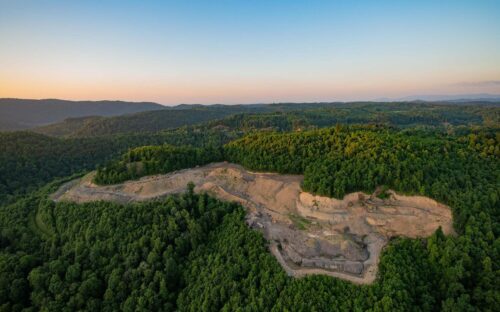
The Nature Conservancy and Cumberland Forest Limited Partnership have announced a new agreement with Sun Tribe Development and ENGIE to develop 14 solar and 3 battery storage projects on a 360 acre old coal mine in the Appalachian Mountains. This is the second round of clean energy project announcements released by the Cumberland Forest Project of the Nature Conservancy in Virginia, Tennessee, and Kentucky. The new project will be developed on previous coal mines, such as the open-pit coal mine in Campbell County, Tennessee. Image source: TNC/Cameron Davidson The Cumberland Forest Energy Project aims to demonstrate that developers can build clean and renewable energy on old mines in an economically efficient manner, while benefiting the community. They adopt renewable energy development methods, striving to create benefits for climate, protection, and community - what TNC calls "3C". TNC uses LevelTen Energy to solicit competitive project proposals and ensure that selected projects comply with 3C standards. As these projects are designed and constructed in the coming years, they are expected to provide more local taxes, short-term construction employment opportunities, and dedicated funds to fund additional community welfare. When choosing a partner company, we look for companies that are willing to work with us to push the boundaries of clean energy development, "said Brad Kreps, Director of TNC Clinch Valley. Developing projects on the former coal mine and engaging local residents in a way that benefits the community requires wisdom, skills, and determination. Ultimately, we chose Sun Tribe and ENGIE, two experienced developers with a strong interest in realizing this vision Sun Tribe's new projects will be located in Virginia and Tennessee. Sun Tribe plans to develop a 5-megawatt solar project and three utility scale energy storage systems, with power generation ranging from 80 megawatts to 150 megawatts. These energy storage projects will improve the reliability of the power grid in the region and reduce the need for future grid upgrades - costs that are typically passed on to utility customers. Danny Van Clief, CEO of Sun Tribe Development, said, "Building solar and battery energy storage facilities in previous mining areas is very reasonable for us. These facilities and their communities have provided our country with electricity supply for over a century - all we need to do is re plan them to adapt to today's energy technologies ENGIE plans to develop 13 community scale solar projects in old mines in Virginia, Tennessee, and Kentucky. These projects also utilize the incentive measures of the Inflation Reduction Act, which helps to reduce project costs. ENGIE's project scale ranges from 1 MW to 6 MW, which will increase local access to clean energy.
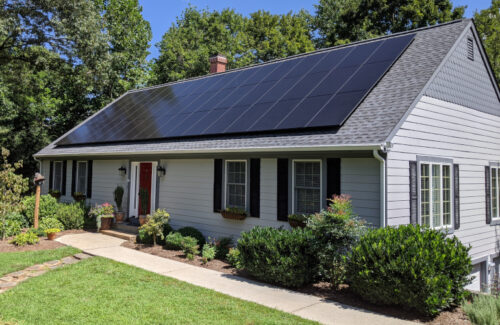
The net metering policy is undergoing changes nationwide, and solar installation companies have reason to be concerned. California's NEM 3.0 significantly reduced export compensation rates, Hawaii shifted towards self-sufficiency, and states such as Arizona and West Virginia also significantly lowered net metering rates. Now Virginia has become a target of public criticism, with Appalachian Power Company (APCo) proposing to reduce net metering compensation by over 70%. Once implemented, these attacks on net metering will have a significant impact on the solar energy industry. For small solar installation companies, this is a real threat - but there is also hope. By observing how markets such as California and Hawaii are responding to similar shifts, we can take proactive measures to protect our businesses and keep solar energy viable. If your state is facing net measurement reform, then the reform is not over yet. Public utility companies often try to quietly push these policies, but public pressure may change the topic. Here are the methods you can use to counterattack: Collaborating with non-profit and industry organizations such as SEIA, Sierra Club, Solar Neighbors, and local environmental organizations has extensive experience in policy struggles and can help garner support. Extend a helping hand, join or create alliances so that you can create a cohesive message to counter the myths propagated by utility companies. Education taxpayers - ensure that customers understand the whole picture. Engage with legislators - get state legislators to pay attention to these issues. Many people are not fully aware of the long-term benefits of distributed solar energy. Encourage public testimony - public utilities rely on the lack of public opposition. Mobilize clients to submit opinions and attend hearings. If policies are exposed, they may change. The public's support has reversed or eased the net measurement rollback in several states, so don't think this struggle has failed.
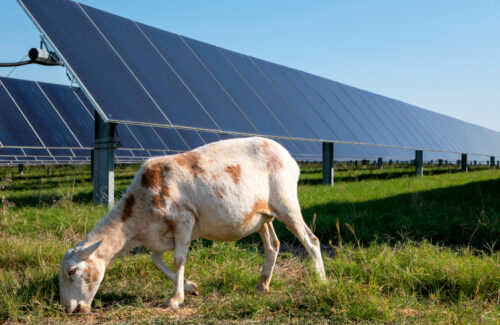
Guided Path Solar is a solar product distributor headquartered in Texas, serving the distributed generation (DG) market. The company will soon supply First Solar cadmium telluride (CdTe) solar panels through its distribution channels. Dr. Mounir El Asmar, Head of Independent Power Plants and Strategic Customers at First Solar, said: "Guided Path Solar's drive comes from a desire for a more sustainable and responsible solar industry, which gives this collaboration a shared core value. We look forward to collaborating with Guided Path Solar to expand the use of our advanced thin-film photovoltaic technology in the US distributed generation market Guided Path Solar is offering First Solar's 6-series, 6-series Plus, and 7-series modules to its customer base for projects of various types and scales. First Solar's large-sized panels are typically used for utility scale projects and will now be offered to commercial scale projects seeking domestic content requirements. Hollis Miles, CEO of Guided Path Solar, said, "We are delighted to collaborate with First Solar, a company that aligns with our values and is equally committed to improving efficiency and sustainability. This partnership enables us to provide our customers with advanced, high-quality solar solutions that exceed industry standards. Together, we pave the way for a more efficient and sustainable future
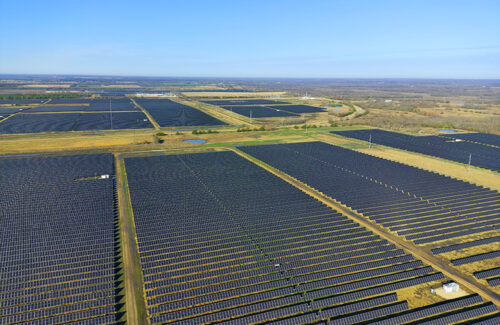
Enel North America, a clean energy company, has started operating a solar+energy storage plant in Delta County, Texas, Estonia. The 202 MW solar photovoltaic facility is paired with a 104 MW battery energy storage system. Stephen Pike, North American Head of Enel Green Power, stated, "With this new project, Enel will continue to provide new clean energy and flexible storage to meet the growing demand. Enel's renewable energy projects have created real value for commercial and industrial companies on the decarbonization path. The Estonia project demonstrates that the private sector will continue to lead the energy transition in the United States Estonia Solar has received support from a Power Purchase Agreement (PPA) signed with workplace developer BXP, which includes 21 megawatts of partial electricity. In addition, the project has also received PPA support from fashion luxury goods holding group Capri Holdings Limited, which is the parent company of Versace, Jimmy Choo, and Michael Kors. Ben Myers, Senior Vice President of Sustainability at BXP, said, "The milestone in Estonia's commercial operations marks an important moment in BXP's renewable energy journey. Through our partnership with Enel, we will support the acceleration of energy transition by adding additional large-scale clean energy capacity The Estonian solar project is expected to generate approximately 499 gigawatt hours of clean electricity annually, equivalent to the electricity demand of over 46000 American households. The construction of the power plant has created approximately 400 construction jobs, as well as multiple new permanent local positions for operation and maintenance. It is expected that this hybrid project will generate over $23 million in new local tax revenue for schools and public services throughout its entire lifecycle. Enel has approximately 5 GW of wind and solar installation capacity and 1.3 GW of battery storage installation capacity, providing support for the ERCOT grid. Enel also manages approximately 200 MW of demand response capacity in Texas.
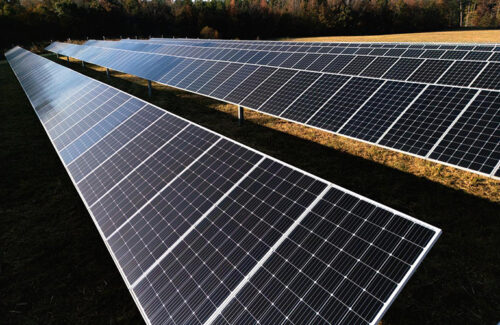
EDP R NA Distributed Generation has completed and launched the 3.4 MWAC Bristol I Community Solar Project in Bristol, Maine. This continues the growth momentum of EDPR NA DG in the community solar field, with operating assets exceeding 61 MWAC across 32 projects in six states. The electricity generated by Bristol One will be supplied to over 400 residential and small business users in southern Maine, who have signed up to purchase electricity from the community project through EDPR's partner PowerMarket. During the development of Bristol I, EDPR collaborated with local developer Midcoast Solar and provided construction services by E&S Electric Company. In addition, EDPR also involved local team members in the development of the project. As a proud Maine native, I am honored to not only be a member of the Bristol I development team, but also a client of this project, "said David Kane, Director of Development at EDPR NA DG. Maine is one of the leading states in the energy transition, with over 600 megawatts of solar energy currently connected to the grid Bristol One will bring sustained economic benefits to the local community, having contributed over $123000 in investments in key services related to schools, public safety, and road maintenance in the form of taxes since 2023. This project has created over 40 construction jobs. Eliza Donoghue, Executive Director of the Maine Renewable Energy Association, said, "Maine is at the forefront of developing reliable, economical, clean, and self-produced energy for residents and the economy. Partners such as EDPR NA distributed generation and community solar projects like Bristol I are necessary for the state's continued development as it responsibly invests in the energy future and maintains grid reliability EDP Renewables North America and EDPR NA DG have been working in Maine for twenty years, developing utility scale and distributed solar projects. In addition to this new project, EDPR also has another 27 MWAC community solar project currently under construction.
Categories
New Products
Tin Roof Rapid Solar Mounting System with Hanger Bolt Read More
Residential Small Solar Easy Bracket Kit for Home Balcony Read More
Automatic Single Pile Solar Tracker with 10 PV Panels Read More
Angle Adjustable Aluminum Easy Solar Panel Bracket for Garden Read More
Intelligent Single Post Dual Row Solar Tracking System Read More
5000ES Solar Off-Grid Energy Storage Inverter Supplier Read More
Multi Drive Double-Sided Single Axis Tracker System Read More
© Copyright: 2025 Xiamen Wintop New Energy Tech Co., Ltd.. All Rights Reserved.

IPv6 network supported